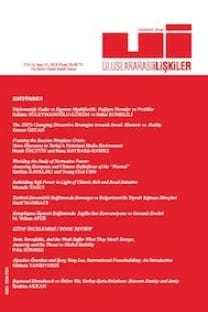Anayasa’da “Milletlerarası Hukukun Meşru Saydığı Haller” Sorunu
Uluslararası hukukta kuvvet kullanımı yasaklanmıştır. Bu ilkenin iki istisnası, meşru müdafaa ile BMGK tarafından BM Şartı’nın VII. Bölümü kapsamında alınacak kararlar uyarınca icra edilecek askeri harekâtlardır. Uluslararası hukuktaki bu sınırlamanın yanısıra, devletler, kendi iç mevzuatlarında da kuvvet kullanımına belirli düzenlemeler getirebilmektedir. Anayasa’nın 92. maddesine göre, savaş hali ilanına, Türk Silahlı Kuvvetlerinin yabancı ülkelere gönderilmesine veya yabancı silahlı kuvvetlerin Türkiye’de bulunmasına izin verme yetkisi, münhasıran TBMM’nindir. Ancak, TBMM’nin bu yetkisi “milletlerarası hukukun meşru saydığı hallerde” koşuluna bağlanmıştır. Bununla birlikte, Anayasa’da bu kavramın ve hallerin ne olduğu tanımlanmadığı gibi, bu tespiti yapmak için izlenecek mekanizma da belirlenmemiştir. Bu nedenle, Anayasanın sözkonusu hükmü ile kuvvet kullanmaya ilişkin uluslararası hukuk kuralları arasındaki ilişkinin ayrıntılı bir şekilde irdelenmesi gerekmektedir.
Anahtar Kelimeler:
Anayasa, BM Şartı, Kuvvet Kullanma, Meşru Müdafaa, Terör, İnsani Müdahale
The Problem of the “Cases Deemed Legitimate by International Law” in Turkish Constitution
International law bans the use of force or threat of force in conduct of international relations while providing for only two valid exceptions to this rule: individual or collective self-defense and collective action authorized by the UNSC. Alongside the contemporary prohibition of the use of force in international relations, states also introduce additional regulations at national level to constrain the use of force. In Article 92 of the Turkish Constitution, the power to declare state of war, and to authorize the dispatch of Turkish troops abroad or deployment of foreign troops on Turkish soil is vested in the Turkish Grand National Assembly. However, this decisive power of the Parliament is subject to the limitation that such authorization may only be granted “in cases deemed legitimate by international law.” The Constitution, however, does not define the term “deemed legitimate by international law”, nor does it identify the mechanism through which this finding may take place. In light of the increase in both frequency and instances of the Turkish Parliament’s granting of authorization of the Government under Article 92, it is essential that there be clarity and understanding about the relationship between the constitutional provision on “cases deemed legitimate by international law” and actual international law governing the use of force
Keywords:
Constitution, UN Charter, Use of Force, Self-defense, Terror, Humanitarian Intervention,
- ISSN: 1304-7310
- Başlangıç: 2004
- Yayıncı: Uluslararası İlişkiler Konseyi Derneği İktisadi İşletmesi
Sayıdaki Diğer Makaleler
Kürdistan Bölgesel Yönetimi: Rantçı Devlet Yaklaşımı Çerçevesinde Bir Değerlendirme
Avrupa Birliği Genişlemesinde Azınlık Koşulu: Doğu Genişlemesi ve Türkiye
Barry BUZAN, An Introduction to the English School ofInternational Relations
Anayasa’da “Milletlerarası Hukukun Meşru Saydığı Haller” Sorunu
Murat BELGE, Militarist Modernization: Germany, Japan and Turkey
